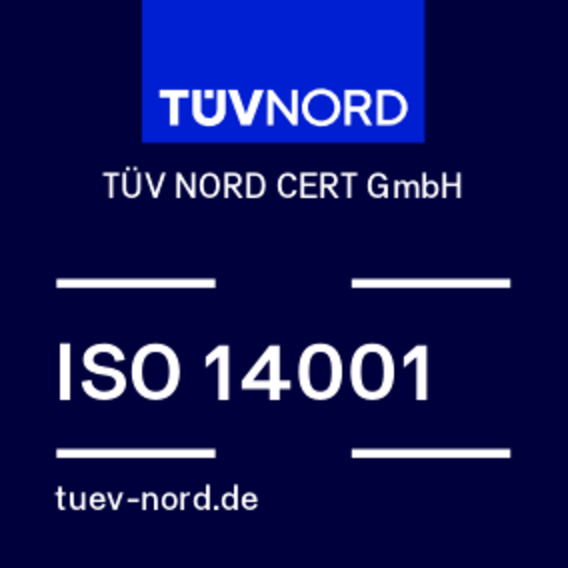ISO 14001 and EMAS



The ever-increasing environmental awareness among the population is also making the topic increasingly important for the economy: companies that make responsibility towards people and nature an integral part of their business practices contribute to sustainability, improve their image and strengthen their market position. Certification in accordance with the internationally recognised ISO 14001 standard provides independent confirmation of environmentally conscious action and is suitable for companies of all sizes and from all sectors.
ISO 14001 can be extended to include the requirements of the Eco-Management and Auditing Scheme (EMAS). In combination, the certification takes into account environmental policy, environmental programmes, the continuous improvement of environmental performance based on core indicators, compliance with environmental legislation and the environmental statement. EMAS certification creates additional trust and ensures greater employee loyalty through the increased involvement of employees: This is because certification means that your employees are jointly committed to environmental protection in your company.
The target group for ISO 14001 certification includes organisations of all sizes and industries that want to strengthen their environmental awareness and improve their market position through sustainable practices. This certification is aimed at organisations that are looking for independent confirmation of their environmentally conscious actions and want to achieve additional trust and stronger employee loyalty by adding EMAS.

ISO 14001 is the most comprehensive environmental management and audit system for the continuous improvement of the environmental performance of companies and organisations and is valid worldwide. It specifies requirements for your environmental management along the entire value chain. It follows the "Plan-Do-Check-Act model" and assesses the environmental impact of processes and products within the company, as well as upstream and downstream processes such as raw material use and logistics.
The standard offers essential additional services such as the continuous improvement of environmental performance and transparency through environmental reporting. Above all, however, verified compliance with the legal regulations ensures legal and liability security for the responsible employees in your company.
The life cycles of services and products are also included in the assessment and opportunities and risks are determined. Thanks to its "High Level Structure" (HLS), it can be combined with other certifications to form an integrated management system.

Today, more and more consumers attach importance to a climate-friendly vehicle. OEMs must meet this demand and at the same time organise their production processes sustainably: In order to survive in international competition and to fulfil the constantly growing legal requirements - including those for scrapping, remanufacturing and recycling. And this applies across the entire supply chain, especially for Tier 1 and Tier 2 component manufacturers. This balancing act can be achieved - but only with certified environmental management systems.
In addition to marketability, ISO 14001 certification offers you other significant advantages: the standard helps you to take a systematic approach, minimise the impact of waste and wastewater on biodiversity and reduce CO2 emissions.
You also save costs by continuously improving your environmental performance. Last but not least, you receive an internationally recognised certificate that attests to your active environmental awareness and enhances your image with customers, partners and the public.
An integrated management system (IMS) combines a company's various management systems, such as quality, environmental, energy and occupational health and safety management, into a standardised structure. This promotes a standardised way of working, increases efficiency and transparency and offers numerous advantages:
Greater employee motivation: Transparency and clear objectives promote acceptance and identification.
An IMS improves efficiency, reduces costs, increases transparency and collaboration, and facilitates the fulfilment of legal requirements. The prerequisite for success is careful planning and implementation, with the High Level Structure (HLS) serving as a central basis to facilitate the integration of the various standards.
ISO 14001 and EMAS certification is suitable for any company or organisation. Smaller companies can benefit from EMAS certification: For them, the review intervals can be extended from three to four years. The required environmental statement only needs to be validated every two years. In addition, the special situation regarding communication, division of labour, training and documentation is taken into account.
Validation in accordance with EMAS supplements ISO 14001 with more extensive requirements, integrated into the European Union's action plan for sustainability in production and consumption and for a sustainable industrial policy. By combining both systems, you support the environment beyond the legal requirements and demonstrate responsible and sustainable behaviour.
ISO 14001 certification is audited in two stages: firstly by inspecting documents and secondly by visiting your company premises. The on-site inspection and the document inspection can ensure that your environmental management system fulfils the requirements of the standard(s).
Validation in accordance with EMAS always relates to the site. In addition to the requirements of ISO 14001, the environmental audit, the involvement of employees and the environmental statement are also audited.
As EMAS includes all the requirements of ISO 14001 in full and both systems can be audited by the same environmental verifier, there are only minor additional costs. We will be happy to make you a customised offer - free of charge and without obligation, of course.